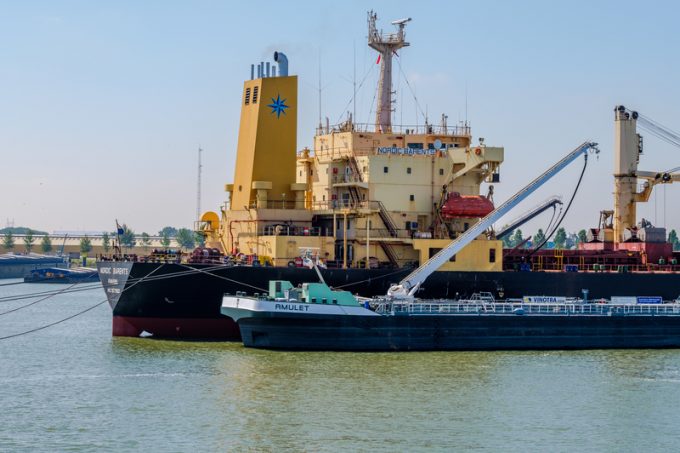HMM to install carbon capture systems on box ships too young to scrap
South Korea’s flagship carrier, HMM, plans to install onboard carbon capture and storage (OCCS) systems ...
UPS: MULTI-MILLION PENALTY FOR UNFAIR EARNINGS DISCLOSUREWTC: PUNISHEDVW: UNDER PRESSUREKNIN: APAC LEADERSHIP WATCHZIM: TAKING PROFITPEP: MINOR HOLDINGS CONSOLIDATIONDHL: GREEN DEALBA: WIND OF CHANGEMAERSK: BULLISH CALLXPO: HEDGE FUNDS ENGINEF: CHOPPING BOARDWTC: NEW RECORDZIM: BALANCE SHEET IN CHECKZIM: SURGING
UPS: MULTI-MILLION PENALTY FOR UNFAIR EARNINGS DISCLOSUREWTC: PUNISHEDVW: UNDER PRESSUREKNIN: APAC LEADERSHIP WATCHZIM: TAKING PROFITPEP: MINOR HOLDINGS CONSOLIDATIONDHL: GREEN DEALBA: WIND OF CHANGEMAERSK: BULLISH CALLXPO: HEDGE FUNDS ENGINEF: CHOPPING BOARDWTC: NEW RECORDZIM: BALANCE SHEET IN CHECKZIM: SURGING

Unlike EU ETS, FuelEU has the rare distinction of being a regulation from which carriers stand to gain – and it could even engineer a situation in which ships are “paid to bunker” green fuels, explained Albrecht Grell, OceanScore MD, this week.
FuelEU’s ‘pooling’ provision will give some ships which bunker biofuel a ‘surplus’ which can be exchanged with other vessels.
This means that, rather than use new green fuels themselves, shipowners may choose to buy allowance from their colleagues, creating a ‘pool’ which couples high-emitting vessels with low-emitting ships. Vessels powered by biofuel could sell on their ‘surplus’.
“In this theoretical example, if you were bunkering B100 and you found somebody to buy the benefit or surplus from you, you would actually be bunkering for minus €240 per ton,” Mr Grell explained.
“You are making money by bunkering.”
This could be passed on to shipper customers in the form of discounts, making it feasible to reduce the cost of ‘insetting’ programmes, such as that described by Hapag-Lloyd fleet manager Capt Silke Lehmkoester, who told The Loadstar recently that the carrier’s Ship Green programme was helping it to retrofit its vessels and deliver greener transits for customers.
Mr Grell made it clear that biofuel was OceanScore’s proposed strategy for dealing with FuelEU, rather than green ammonia, hydrogen or methanol. He said: “I think these fuels are sexier, because they require new engines and new regulation.
“But for all practical purposes, biofuels are the way to go for the next few years. It’s just there; it’s simple, it’s wanted, so I think that would be the way. That’s what I see ramping up in many ports.”
As to Maersk and its brief love affair with methanol, Mr Grell said: “That’s a price innovators pay, and we know shipping is difficult with innovation because it’s slowly adopting and it’s easy to copy. I think it’s a good thing they did that.”
Comment on this article